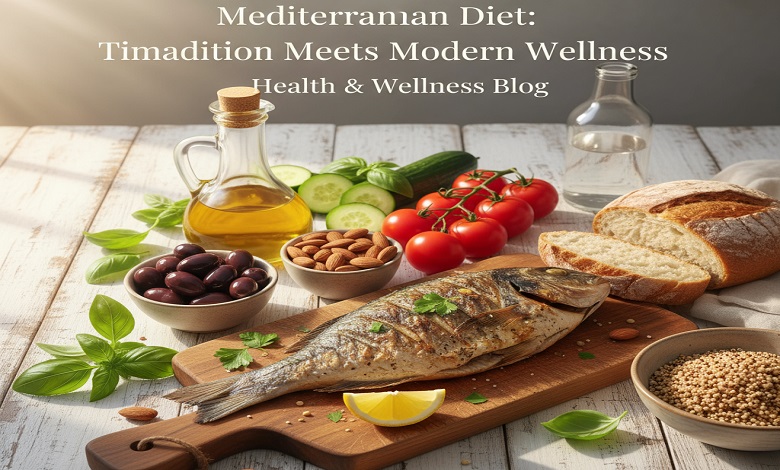Mediterranean Diet: Timeless Tradition Meets Modern Wellness

The Mediterranean Diet has long been praised as one of the healthiest eating patterns in the world. Rooted in the traditional cuisines of Greece, Italy, and Spain, it emphasizes whole foods, healthy fats, and a balanced lifestyle. In 2025, it continues to stand out not just as a diet, but as a long-term approach to living well. But how does it compare with other popular diets, and is it really worth following? Let’s explore in detail.
🌍 Why the Mediterranean Diet is Trending
In an era where fad diets come and go, the Mediterranean Diet has held its ground for decades. It’s not about restriction or cutting out entire food groups—it’s about enjoying fresh, nutrient-rich meals that promote heart health, longevity, and mental clarity.
The diet’s popularity is also linked to its scientific backing. Studies consistently show that those who follow it have lower risks of cardiovascular disease, type 2 diabetes, and even cognitive decline. Unlike extreme plans like keto or intermittent fasting, the Mediterranean Diet is more sustainable and adaptable to everyday life.
🥑 Mediterranean vs. Other Diets
When compared to trendy diets, the Mediterranean lifestyle offers a more balanced and flexible approach:
- Keto Diet: While keto focuses heavily on fats and eliminating carbs, the Mediterranean Diet allows whole grains, fruits, and legumes, making it more varied and easier to maintain.
- Paleo Diet: Paleo excludes dairy and grains entirely, whereas the Mediterranean Diet embraces moderate dairy (like yogurt and cheese) and whole grains, giving it more diversity.
- Intermittent Fasting: IF focuses on when you eat, not what you eat. The Mediterranean Diet, on the other hand, centers on food quality, emphasizing fresh vegetables, olive oil, fish, and nuts.
This comparison highlights why the Mediterranean Diet is often ranked #1 for overall health and long-term sustainability.
💪 Health Benefits Backed by Science
The Mediterranean Diet is much more than a way to lose weight—it’s a lifestyle approach that brings numerous benefits:
- Heart Health ❤️: Rich in monounsaturated fats from olive oil and omega-3s from fish, it lowers bad cholesterol and supports cardiovascular wellness.
- Weight Management ⚖️: It naturally promotes portion control through fiber-rich foods, reducing overeating without strict calorie counting.
- Cognitive Support 🧠: Studies show a link between this diet and reduced risk of Alzheimer’s and dementia.
- Longevity & Energy 🌿: Packed with antioxidants and anti-inflammatory foods, it fuels the body for an active, vibrant lifestyle.
🍷 Food Experience & Lifestyle
One reason for the diet’s global appeal is that it feels less like a diet and more like a celebration of food. Meals often include:
- Fresh vegetables drizzled with extra-virgin olive oil
- Whole-grain bread with hummus or dips
- Grilled fish seasoned with herbs
- A glass of red wine enjoyed socially
Unlike restrictive plans, this way of eating prioritizes pleasure, balance, and community, which is why many find it easy to follow long term.
🛒 Products & Subscriptions for the Mediterranean Lifestyle
With its rising popularity, many brands now offer products and subscriptions tailored to the Mediterranean Diet. For example, you can find meal kit plans designed around Mediterranean recipes, pantry bundles that include olive oil, whole grains, and nuts, or even supplements inspired by Mediterranean nutrition.
These options make it easier than ever to bring the flavors and health benefits of this lifestyle into your everyday routine.
🌟 Sustainability & Global Appeal
Another reason the Mediterranean Diet is gaining attention is its sustainability factor. By relying on seasonal vegetables, local produce, and minimal processed foods, it supports not only personal health but also the planet.
This eco-conscious edge resonates strongly with modern consumers who want diets that align with their values of environmental responsibility.
✅ Pros & ❌ Cons of the Mediterranean Diet
Pros:
- Scientifically backed for heart and brain health
- Flexible, balanced, and easy to maintain
- Delicious meals with cultural richness
- Supports sustainability and mindful living
Cons:
- May be more expensive due to reliance on fresh produce and quality oils
- Weight loss may be slower compared to restrictive diets
- Requires meal prep and cooking for best results
🔮 The Future of the Mediterranean Diet
Looking ahead, the Mediterranean Diet is set to remain a gold standard in nutrition. Expect to see more personalized meal plans, subscription services, and functional food products inspired by Mediterranean principles. With tech-driven wellness apps, people can now track macros, plan meals, and shop for Mediterranean staples at the tap of a button.
This shows how tradition and technology can merge to create a healthier, more sustainable future.
🥗 Final Verdict: A Diet That’s Here to Stay
Unlike quick-fix diets, the Mediterranean Diet offers a timeless approach to health. With its balance of science, flavor, and sustainability, it continues to be one of the most reliable choices for anyone seeking better wellness in 2025.
Whether you’re a health enthusiast, a busy professional, or someone simply wanting to eat better, embracing this diet—or trying a Mediterranean meal subscription plan—could be the start of a healthier, longer, and more enjoyable life.




